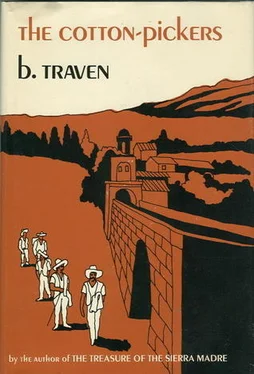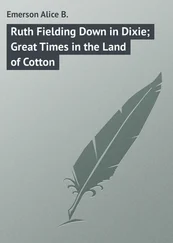B. Traven - The Cotton-Pickers
Здесь есть возможность читать онлайн «B. Traven - The Cotton-Pickers» весь текст электронной книги совершенно бесплатно (целиком полную версию без сокращений). В некоторых случаях можно слушать аудио, скачать через торрент в формате fb2 и присутствует краткое содержание. Год выпуска: 1969, Издательство: Hill and Wang, Жанр: Проза, на английском языке. Описание произведения, (предисловие) а так же отзывы посетителей доступны на портале библиотеки ЛибКат.
- Название:The Cotton-Pickers
- Автор:
- Издательство:Hill and Wang
- Жанр:
- Год:1969
- ISBN:нет данных
- Рейтинг книги:3 / 5. Голосов: 1
-
Избранное:Добавить в избранное
- Отзывы:
-
Ваша оценка:
- 60
- 1
- 2
- 3
- 4
- 5
The Cotton-Pickers: краткое содержание, описание и аннотация
Предлагаем к чтению аннотацию, описание, краткое содержание или предисловие (зависит от того, что написал сам автор книги «The Cotton-Pickers»). Если вы не нашли необходимую информацию о книге — напишите в комментариях, мы постараемся отыскать её.
—Book World
The Cotton-Pickers — читать онлайн бесплатно полную книгу (весь текст) целиком
Ниже представлен текст книги, разбитый по страницам. Система сохранения места последней прочитанной страницы, позволяет с удобством читать онлайн бесплатно книгу «The Cotton-Pickers», без необходимости каждый раз заново искать на чём Вы остановились. Поставьте закладку, и сможете в любой момент перейти на страницу, на которой закончили чтение.
Интервал:
Закладка:
“Dammit, that might turn out to be six hundred.”
“Not so unlikely. Still, as far as I’ve figured, it might be possible to keep a fairly direct route.”
“What about pay?”
“Six pesos a day. I provide horse, saddle, and equipment. You cook your own food on the way. I’ll send along six of my men whom the animals are well used to — Indians. The foreman, a Mestizo, will also go with you. He’s quite a good man, reliable. I might perhaps trust him with the herd — but no. If he’d sell the herd on the way, and bolt, I could do nothing about it. His wife and children live on my ranch, but that’s no security! You could search for the likes of him forevermore in this country. Besides, I wouldn’t like to give him so much money to carry about; on the other hand, I couldn’t send him off without money. There are so many expenses on the drive and it’s not fair to tempt any man that way. As for me, I can’t stay away from the rancho that long. The bandits’d be around the place before you could say knife. That’s why I’d like to get hold of a gringo like you to take over the drive.”
“Well, I don’t know if I’m as honest as you think. Not yet, anyhow,” I said with a laugh.
“I, too, know how to bolt with a herd. After all, you’ve just picked me up in the street.”
“I judge a man by his face,” Mr. Pratt went on; then, after a pause, “to be perfectly honest, I’m not trusting entirely to luck. I know you.”
“You know me? I can’t imagine how.”
“Didn’t you work for a farmer Shine?”
“Yes.”
“I saw you there. And I have Mr. Shine’s word that I can rely on you. So you’ll have the contract, you’ll drive the herd, and I’ll advance you money to pay your daily expenses.”
“Very well! But what about the contract bonus?”
Mr. Pratt was silent for a while, then took out his notebook, made a few calculations, and said: “I’ve leased pastureland near the port, two miles from the main terminal market. It’s well fenced. There I can wait for cattle buyers to come to me, and I’ll probably get orders for several shiploads. If not, I’ll sell the herd in small lots. I’ve got a good and very reliable agent there who’s been working with me for years, and has always got good prices.”
“That’s all very well,” I interjected, “but what about my contract and bonus?”
“All right. For each head that you drive through, sound from horn to hoof, I’ll pay you sixty centavos extra. If your losses are less than two percent, I’ll give you a hundred-peso bonus on top of that, plus your pay.”
“What about the losses?”
“I’ll deduct twenty-five pesos for every head lost above two percent,” said Mr. Pratt.
“Just a moment,” I broke in. I made a few quick calculations myself on the margin of a newspaper. “Sold,” I agreed. “Let me have a note of the contract.”
He tore a leaf out of his little notebook, wrote the conditions of our contract in pencil, signed it and handed it to me. “Your address?” he asked.
“My address? That’s an awkward point!” (I really didn’t have an address.) “Let’s say right here, Hotel Palacio.”
“Okay. All right.”
“How do matters stand at present? Has the herd been cut out?”
“No, not a single head has been cut out yet. There’ll be a few yearlings, but most of the herd’ll be two- and three-year-olds. Yes, a few four-year-olds, too. I’ll help you cut them out.”
“All branded?”
“All of them. No trouble there.”
“What about the leader bulls?”
“That’s your problem. You’ll have to see about them.”
“All right by me. I can manage to pick them.”
Mr. Pratt got up. “Now let’s have a drink, and then you’re going to have dinner with me. Afterward, I’ve got some private business to attend to.”
What his private business was, that was no concern of mine. I’m not curious when it comes to private business. One of the many reasons why I am still alive.
When we parted after dinner, Mr. Pratt asked how much advance I wanted. “Nothing,” I said.
“What? You don’t need an advance?” He acted astonished. “That sounds funny. Where did you come by your cash on hand?”
“In the gambling casino.”
“Huh! I’ll have a go at it myself, Gales, later tonight. Maybe I can win your wages and bonus.”
“You won’t win them from me, Mr. Pratt. You won’t even see me there, for I mean to keep what I’ve got.”
“I wouldn’t want to win money off you, Gales. I’ll win it off the others. There’re always a few crazy ones in from the oil camps who can’t get rid of their cash quick enough. I’ll make a solo table with two or three of them. If you want to learn how it’s done, come along and watch me.”
“No, thanks, not interested ! ” I said, and went on my way.
21
The next morning at five we boarded the train, a sixteen-hour express ride to the Pratt ranch ahead of us. I knew I’d be doing well if I drove the cattle back to the terminal in twice sixteen days.
The express train was a good one, made in Europe. There were only two classes in the coaches, first and second, Mexico having less class distinction than some four-class countries of Europe. Here, a first-class ticket cost a little more than twice that of second class; but you traveled just as rapidly in second as in first, and second wasn’t at all uncomfortable.
First-class seats were arranged in two rows with an aisle between, the passengers facing forward. In second class, where mostly the poorer natives traveled, benches ran along the sides of the coach and at right angles to the benches were more seats. All seats were innocent of upholstery; but most of the second-class passengers carried enough blankets and bundles to upholster theirs.
The huge locomotives were fired by oil, and they had to produce great power to cross some of the highest railroad grades in the world. Behind the oil-tank tender were the express and luggage coaches and the mail car. Then came two long second-class coaches, a great first-class coach, and at the end ran the Pullman sleeper.
At the head of the second-class coaches there was always a detachment of soldiers, twelve to eighteen men, rifles loaded, an officer in charge. This detachment was a necessary precaution against attacks from bandits; but in spite of the presence of soldiers, such attacks still occurred. The ensuing battles between soldiers and bandits often lasted several hours and involved a number of dead.
There were no such things as grade crossings with automatic signals, nor even signalmen. The train rushed at a mad speed through jungle, bush, and tilled valley, across upland prairies, and over the Sierra Madre Oriente, whose highest peaks are covered with perpetual snow. Bridges spanned wide gorges, forty, fifty, and two hundred yards deep and several miles long; the bridges were of wood trestle, and the train tore across them at terrific speed.
Nowhere was the railroad track fenced off, and cattle, horses, burros, mules, sheep, pigs, goats, and wild animals of all kinds roamed along it and sometimes grazed or dozed between the rails. The locomotive gave off a blood-curdling hoot to clear the track, and sometimes the animals would clear off, and of course at other times wouldn’t budge until the train stopped and one of the soldiers got out and threw stones at them. Sometimes the beasts ran head-on into the locomotive, or were caught without warning around a curve; so that the railroad embankment all along the way was marked with animal skeletons on either side.
Now and then we came upon wounded beasts, their legs crushed or bodies torn open, lying waiting for death, thirsting, crazed, under the tropical sun. No passer-by would kill them and put them out of their misery, because their owner might be lurking within sight and be capable of dragging the do-gooder into court and getting him fined for unauthorized slaughter of his beasts to the tune of fifty or a hundred pesos, or more. If you were pretty sure that you were unobserved you might put your pistol in the animal’s ear and put him out of his suffering; then you’d better take to your heels, pronto. It’s costly, taking pity on animals.
Читать дальшеИнтервал:
Закладка:
Похожие книги на «The Cotton-Pickers»
Представляем Вашему вниманию похожие книги на «The Cotton-Pickers» списком для выбора. Мы отобрали схожую по названию и смыслу литературу в надежде предоставить читателям больше вариантов отыскать новые, интересные, ещё непрочитанные произведения.
Обсуждение, отзывы о книге «The Cotton-Pickers» и просто собственные мнения читателей. Оставьте ваши комментарии, напишите, что Вы думаете о произведении, его смысле или главных героях. Укажите что конкретно понравилось, а что нет, и почему Вы так считаете.











